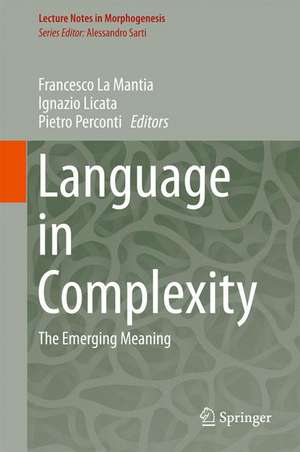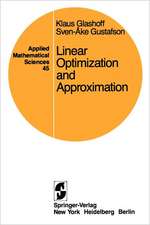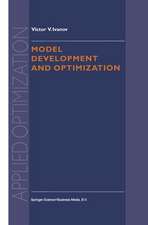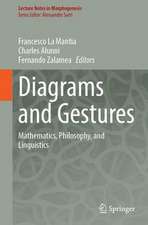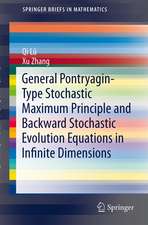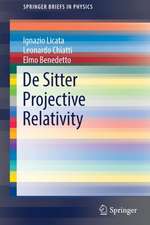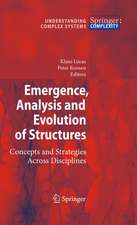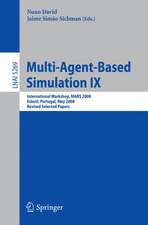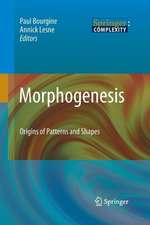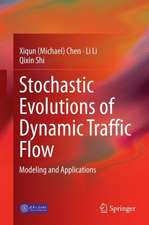Language in Complexity: The Emerging Meaning: Lecture Notes in Morphogenesis
Editat de Francesco La Mantia, Ignazio Licata, Pietro Percontien Limba Engleză Hardback – 27 iul 2016
1) Facing complexity in the right way: mathematics and complexity
2) Complexity and theory of language
3) From empirical observation to formal models: investigation of specific linguistic phenomena, like enunciation, deixis, or the meaning of the metaphorical phrases
The application of complexity theory to describe cognitive phenomena is a recent and very promising trend in cognitive science. At the time when dynamical approaches triggered a paradigm shift in cognitive science some decade ago, the major topic of research were the challenges imposed by classical computational approaches dealing with the explanation of cognitive phenomena like consciousness, decision making and language. Thetarget audience primarily comprises researchers and experts in the field but the book may also be beneficial for graduate and post-graduate students who want to enter the field.
| Toate formatele și edițiile | Preț | Express |
|---|---|---|
| Paperback (1) | 637.13 lei 6-8 săpt. | |
| Springer International Publishing – 31 mai 2018 | 637.13 lei 6-8 săpt. | |
| Hardback (1) | 643.34 lei 6-8 săpt. | |
| Springer International Publishing – 27 iul 2016 | 643.34 lei 6-8 săpt. |
Din seria Lecture Notes in Morphogenesis
- 18%
 Preț: 1118.45 lei
Preț: 1118.45 lei - 15%
 Preț: 585.73 lei
Preț: 585.73 lei - 24%
 Preț: 708.08 lei
Preț: 708.08 lei -
 Preț: 391.61 lei
Preț: 391.61 lei - 20%
 Preț: 426.75 lei
Preț: 426.75 lei - 18%
 Preț: 731.28 lei
Preț: 731.28 lei - 15%
 Preț: 649.87 lei
Preț: 649.87 lei - 18%
 Preț: 1223.25 lei
Preț: 1223.25 lei - 15%
 Preț: 643.84 lei
Preț: 643.84 lei -
 Preț: 393.90 lei
Preț: 393.90 lei -
 Preț: 391.22 lei
Preț: 391.22 lei -
 Preț: 361.74 lei
Preț: 361.74 lei - 18%
 Preț: 1050.07 lei
Preț: 1050.07 lei - 20%
 Preț: 980.22 lei
Preț: 980.22 lei - 15%
 Preț: 639.59 lei
Preț: 639.59 lei - 18%
 Preț: 885.00 lei
Preț: 885.00 lei - 24%
 Preț: 688.56 lei
Preț: 688.56 lei - 18%
 Preț: 721.68 lei
Preț: 721.68 lei - 24%
 Preț: 727.36 lei
Preț: 727.36 lei - 24%
 Preț: 915.57 lei
Preț: 915.57 lei - 18%
 Preț: 727.18 lei
Preț: 727.18 lei - 18%
 Preț: 1114.83 lei
Preț: 1114.83 lei - 18%
 Preț: 725.61 lei
Preț: 725.61 lei - 18%
 Preț: 837.96 lei
Preț: 837.96 lei
Preț: 643.34 lei
Preț vechi: 756.86 lei
-15% Nou
Puncte Express: 965
Preț estimativ în valută:
123.11€ • 131.64$ • 102.64£
123.11€ • 131.64$ • 102.64£
Carte tipărită la comandă
Livrare economică 17 aprilie-01 mai
Preluare comenzi: 021 569.72.76
Specificații
ISBN-13: 9783319294810
ISBN-10: 3319294814
Pagini: 168
Ilustrații: XXVI, 199 p. 18 illus., 12 illus. in color.
Dimensiuni: 155 x 235 x 14 mm
Greutate: 0.5 kg
Ediția:1st ed. 2017
Editura: Springer International Publishing
Colecția Springer
Seria Lecture Notes in Morphogenesis
Locul publicării:Cham, Switzerland
ISBN-10: 3319294814
Pagini: 168
Ilustrații: XXVI, 199 p. 18 illus., 12 illus. in color.
Dimensiuni: 155 x 235 x 14 mm
Greutate: 0.5 kg
Ediția:1st ed. 2017
Editura: Springer International Publishing
Colecția Springer
Seria Lecture Notes in Morphogenesis
Locul publicării:Cham, Switzerland
Cuprins
Introduction.-The Game of Complexity and Linguistic Theorization.- Continuity in the Interactions between Linguistic Units.- Modeling Language Change.- The Case for Cognitive Plausibility.- System and Structure.- Hjelmslev and the Stratification of Signs and Language.- From Topology to Quasi-Topology.- Fiat Lux versus Fiat Lumen.- Two Ways into Complexity.- Language and Brain Complexity
Textul de pe ultima copertă
This contributed volume explores the achievements gained and the remaining puzzling questions by applying dynamical systems theory to the linguistic inquiry. In particular, the book is divided into three parts, each one addressing one of the following topics:
1) Facing complexity in the right way: mathematics and complexity
2) Complexity and theory of language
3) From empirical observation to formal models: investigation of specific linguistic phenomena, like enunciation, deixis, or the meaning of the metaphorical phrases
The application of complexity theory to describe cognitive phenomena is a recent and very promising trend in cognitive science. At the time when dynamical approaches triggered a paradigm shift in cognitive science some decade ago, the major topic of research were the challenges imposed by classical computational approaches dealing with the explanation of cognitive phenomena like consciousness, decision making and language. The target audience primarily comprises researchers and experts in the field but the book may also be beneficial for graduate and post-graduate students who want to enter the field.
1) Facing complexity in the right way: mathematics and complexity
2) Complexity and theory of language
3) From empirical observation to formal models: investigation of specific linguistic phenomena, like enunciation, deixis, or the meaning of the metaphorical phrases
The application of complexity theory to describe cognitive phenomena is a recent and very promising trend in cognitive science. At the time when dynamical approaches triggered a paradigm shift in cognitive science some decade ago, the major topic of research were the challenges imposed by classical computational approaches dealing with the explanation of cognitive phenomena like consciousness, decision making and language. The target audience primarily comprises researchers and experts in the field but the book may also be beneficial for graduate and post-graduate students who want to enter the field.
Caracteristici
Provides a useful and comprehensive didactic toolbox: conceptual maps, diagrams, synoptic tables, etc. Includes indexes and references for a safe and quick navigation through the text Attempts to bridge hard sciences and humanities by carefully introducing adequate vocabulary Written by experts in the field Includes supplementary material: sn.pub/extras
